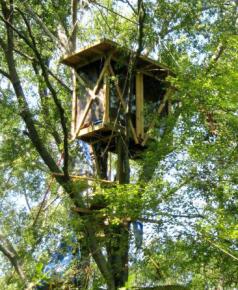Uniting to stop the pipeline
reports on the struggle against the Keystone pipeline project as residents in East Texas organize a grassroots mobilization to shut it down.
AN IMPORTANT struggle is unfolding deep in the pine woods of East Texas where unlikely allies are uniting against TransCanada and the project that's been called "game over for the environment."
Five years ago, TransCanada starting knocking on the doors of East Texas landowners gathering easement agreements--agreements that would give TransCanada temporary permission to pass through their land.
In 2007, the government of Canada approved a project that would carry Alberta tar sands to the U.S.-Canadian border. The U.S. government consented in 2008, and by 2010, the Keystone pipeline extended from Alberta to southern Illinois.
It took longer than two years for TransCanada to obtain the necessary landowner, county, state and federal approvals to construct the pipeline. Once it was finished, the Keystone pipeline leaked 12 times in the first 12 months of operation.
TransCanada then set its eyes on an expansion that would run from Nebraska to the Gulf of Mexico. East Texas landowners wondering what a Canadian company wanted with their land suddenly understood. Landowners say TransCanada bullied and lied to them to obtain agreements.

Texas landowners near Nacogdoches and Winnsboro organized a group, Stop Tar sands Oil Permanently (STOP), to publicize TransCanada's misdeeds and to defend landowners who had still refused to capitulate to the Keystone XL project.
Outside of these communities, few ever heard of TransCanada or the Keystone XL Pipeline until the Tar Sands Action in Washington, D.C. On November 6, 12,000 people gathered outside the White House to ask the president to make the right choice --deny TransCanada's request to cross the U.S.-Canadian border with their toxic oil.
The action resulted in Obama postponing his decision until 2013, well after election season. But he turned around and endorsed the southern leg of the pipeline, the "Gulf Coast Segment" and was present in Cushing, Okla., when construction first began.
TEXAS ENVIRONMENTAL activists inspired by the Tar Sands Action and the "Summer of Solidarity" declared for the following year, discovered a community of landowners in East Texas already organizing grassroots resistance to TransCanada's abuse of easement rights and eminent domain granted by the state of Texas.
These activists combined forces, adopted the name Tar Sands Blockade and connected their concerns for the environment and landowner rights. Using direct action, they plan to delay the pipeline for as long and as often as possible, to unite the community, and to inspire others to rise up to defend their homes and ecosystems.
Tar Sands blockaders have been training themselves to stand up to TransCanada through direct action techniques and since early August, have been regularly locking themselves to the company's equipment to halt construction of the pipeline.
Activists have attached themselves to trucks, bulldozers and tree fellers to delay the tar sands advance. Each action typically brings work to a stop for one day. Each delay, as well as halting construction, has bought more time for the Blockade to finish what they call the "tree village," a complex of tree-based platforms as high as 80 feet from the forest floor and protected by a 100 feet wide, 40 feet tall fortified timber wall.
TransCanada discovered their tree village on Monday as eight blockaders secured themselves in the trees, prepared to hold out indefinitely and protected by their height and metal screens preventing others from climbing up behind them.
Three more people have adopted a catwalk atop the timber wall as their place of resistance. Their tree-sits now block TransCanada's entire easement area for an expanse of at least 500 yards.
On Tuesday, as tree removal equipment encroached within 400 yards of the wall, two blockaders attached themselves to the machine. Blockaders say that TransCanada urged police to use torture tactics to dislodge the activists. These individuals join 12 others who have gone to jail for their blockade actions.
On Wednesday, the third day of sustained tree-sits and wall-based blockading, TransCanada encroached within 20 feet of protesters, flaunting safety laws and the lives of blockaders.
Tar Sands Blockade says that this is only the first stage of resistance, TransCanada still has to dig a trench and lay the pipe. "Every day is a day we grow stronger," says the campaign, "no one considers this to be the last stand."
The tar Sands Blockade's dedication to opposing the simple truth of corporate injustice has inspired others to fight back as well. The Tar Sands Blockade approached one landowner, David Hightower, when they noticed the pipeline's route was to cross his property, destroying the vineyard he's tended for 12 years.
David welcomed their support, but had no idea that the next few days would bring as many as 30 protesters to his yard, including some from as far as Maine and others who owned land just down the road. David opened his home and heart to the Tar Sands Blockade, who stood up for his home, the wine he made a living on, and drew media attention to him and other local landowners.
Jerry Hightower, David's nephew, is quick to remind people that his uncle is an Air Force veteran of 20 years and in speaking of the injustices his family has faced he ends pointedly, saying, "and this is how they treat someone who's served his country."
Jerry has become a supporter of the Tar Sands Blockade and is happy to share what he's learned from their common struggle. "Our local police are hired and bought security guards for TransCanada," he said.
The growing struggle in East Texas mirrors the common fight of people versus profit in Chicago, Spain, China, South Africa and Peru. The fight is local, but like many fights today, it will have global consequences.


